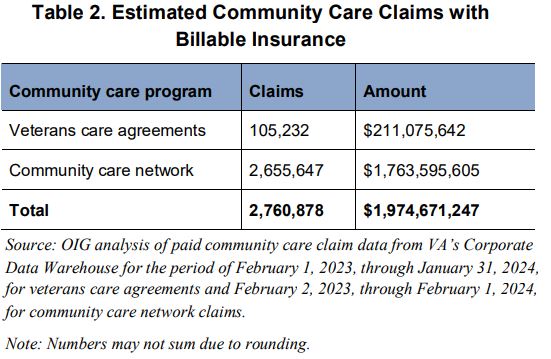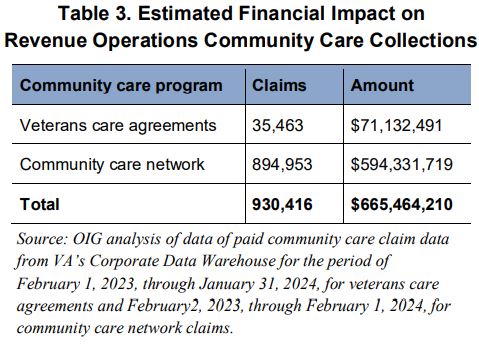Down More Than a Year, It Tracks Community Provider Billing
WASHINGTON, DC — VA is close to restarting a software tool integral to allowing the department to track its billing of community providers. The Program Integrity Tool (PIT) has been offline since flaws in the system were discovered in February 2023. During that time, VA has been delayed in collecting nearly $1 billion in third-party insurance fees and co-pays.
The tool also allows VA to more easily track fraud, waste and misuse of the community care system. With it offline, VA staff have had to resort to more laborious manual methods of tracking.
VA introduced the PIT tool in 2013 as a way of compiling data from its multiple community care programs in a single place. In 2020, the department awarded an $11 million contract to Halfaker and Associates, a technology solutions provider, to oversee PIT.
In January 2023, VA discovered that the system was not operating properly. Impatient and outpatient data were being mixed up and claims data was being listed out of order, creating duplicate claims that could result in overpaying providers. The following month, the system was put on a pause that was expected to last only through April 2023.
“We found fault in the contractors’ work and [determined we] needed a larger team,” explained VA Chief Information Officer Kurt DelBene at the House VA Technology Modernization Subcommittee hearing. “Without minimizing in any way the work they did to cause these problems, they were very diligent in helping us fix the problems, once they were brought to their attention. … [We also] removed the senior executive in charge of the program, because they weren’t engaged enough. … No matter how large your portfolio is, you should understand every part of it intimately so you understand when something is off the rails. I didn’t believe this executive had that mindset, so we moved him to another position, and subsequently he left VA.”
The PIT is now partially back online, with the system being used for billing. According to VA officials, the fraud-detection portion isn’t expected to be finished until FY 2025 at which time the PIT will resume daily processing.
When asked at a separate hearing what the impact is from PIT being down, VA Under Secretary for Health Shereef Elnahal, MD, told legislators, “It’s quite significant. It’s in the hundreds of millions. … We cannot get it back online fast enough.”
As for whether the delayed collections are partially responsible for VA’s recent budget shortfalls, Elnahal said it was not.
“It’s less a budgetary issue and more a cashflow issue,” he explained. “Ultimately, the cash in the back account is lower than what we’d expected.”
VA officials assured subcommittee members that VA would eventually recover the missed payments, which the VA Office of the Inspector General (OIG) totaled at $695 million in February 2024 and estimated was growing at a rate of $55 million each month.
100% Collection?
“I believe that we’ll be able to collect what is due, to the extent that it was delayed as a result of PIT. I can’t commit to 100% collection any more than in any year,” VA Chief Financial Officer Laura Duke testified. “We will collect. It will just be delayed. VA has six years to bill.”
Most of that billing will be to the third-party insurance companies, but a portion consists of co-pays that will be billed directly to veterans. Some legislators expressed concern about veterans receiving an unexpected backlog of co-pays from procedures and appointments from more than a year ago.
Duke explained that VA is very soft on deadlines for co-pays, and that they will extend payment plans as far into the future as necessary. In order to waive co-pays, VA will need to seek additional legislative authority.
That backlog of data will also need to be analyzed for signs of waste, fraud and abuse, once the PIT is fully online, something VA officials have been doing using more manual methods for the last year and a half.
“As soon as it became clear that PIT was not going to be online as quickly as we hoped, we started building data queries, data pulls to look into the upstream payment system to do the same types of analytics that we’ve always done to identify potential fraudulent, wasteful and/or abusive billing,” explained Tracy Davis-Bradley, PhD, VA’s chief integrity and compliance officer.
The more “upstream” in the process that VA can examine, the less impact payment mistakes—intentional or otherwise—will have to VA, Davis-Bradley said. “For example, an upstream issue where the location of service doesn’t match a procedure code; you can’t have a surgery at home. These are all controls where, if we can prevent the payment instead of discovering it after the payments’ been made, we’ve never spent the money.”
While VA seemed confident that they could work through the backlog in a timely manner, OIG officials are skeptical. In its July report analyzing the PIT pause, investigators said they remained concerned that VA has enough staff to handle such a large backlog and that, historically, VA has not been particularly efficient when it comes to insurance billing for community care.



